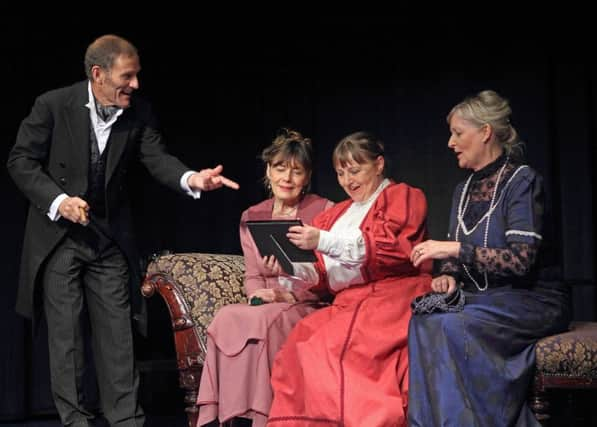Review: High Tor Players sparkle in When We Are Married


Under Bryce Glithero’s direction, the Players fully exploited the comedy of the work with some hilarious performances from a strong ensemble cast, while also mining the emotional core to make for a very satisfying evening.
Priestley wrote the play in 1938, looking back to the time of his boyhood in the West Riding at the turn of the 20th century. Three couples from the fabulously-named Cleckleywyke who wed on the same day reunite to celebrate their joint silver wedding, only to discover that owing to an error the original ceremony was not valid – so they have apparently been living together,
Advertisement
Hide AdAdvertisement
Hide Adunmarried, for 25 years. Priestley acknowledged that the plot was pretty daft - a touch of Cosi Fan Tutte as the couples are uncomfortably confronted with their feelings for each other when they find they might now have a choice of partner - but maintained that the characters and their attitudes and their talk were authentic.
As in the best comedies, the cast brought out how the situation teeters on the verge of tears and even tragedy before it is (kind of) happily resolved.
The three couples form the centre of the action. Glithero’s direction, helped by Priestley’s sparkling script, drove the play along at a pace with the different characters becoming clearly established. The three men and three women naturally split into two sides and the confrontations between the two groups were particularly well done.
Simon Brister took the anchor role of Alderman Joe Helliwell, ringleader of the sheepish trio, who sneak off to their club to work out how to break the news to their wives that they are not actually married, and then shuffle back in, only to find that the cat is already out of the bag. Brister drew out the warm and emotional side of Helliwell’s character as he frequently flies off the handle but showing that he is up for a bit of fun, always wanting people to enjoy themselves. When Lottie, played by Jane Small, turns up as an unexpected and not totally welcome visitor from Helliwell’s past, his exclamation is one of delight and not the horrified shock which might have been expected.
Advertisement
Hide AdAdvertisement
Hide AdMark Poole as Councillor Albert Parker mined the humour of a self-important man with plenty to say and no self-awareness, while Martin Devaney gave a well-characterised portrayal of the mild and thoughtful Herbert Soppit who becomes a worm that turns.
Meanwhile the three wives, played by Liz McKenzie (Clara Soppit), Kathy Padley (Annie Parker) and Susan Devaney (Maria Helliwell) together conveyed greater emotional strength and solidity than their rather feeble husbands, while displaying very different characters. (One of the pleasures of this play is the strong roles and great lines Priestley wrote for the women, with half of the fourteen cast members being female.) Facing the situation where they seem to be not married to their erstwhile husbands, the emotions played out with great commitment all round ranged from anger and jealousy to boredom, loss and grief.
Liz McKenzie was hilarious as Clara and got some of the best lines. Her two-syllable enunciation of “C-lub!” when she hears where the men have disappeared to was memorable - up there with Lady Bracknell’s “A handbag?” Kathy Padley as Mrs Parker delivered a quietly devastating verdict on her husband when he is fatuous enough to ask her why she could possibly be discontented with him. Susan Devanay brought genuine feeling into her altercations with Helliwell, showing that of the three relationships, theirs at least has solid foundations.
The play was enriched by the commitment of all the performers, with Priestley’s cast of characters including Lottie, two servants, the press (Yorkshire Argus reporter and photographer), a local clergyman, and a young couple about to get engaged. The Chapel organist (played by Chris Gale) is the cool young man from down south who kicks off the plot by producing the fatal letter which seems to demonstrate that the couples weren’t properly married.
Advertisement
Hide AdAdvertisement
Hide AdCharlotte Gale played the pert maidservant Ruby Birtle with a lot of humour, especially in her scene with the photographer Henry Ormonroyd. Dennis Todd as the increasingly tiddly and rumpled Ormonroyd was a complete hoot and risked stealing the show. Pauline Revill as the mouthy charlady belted home her parting shots with the aggression of a Navratilova.
It’s invidious to single out individuals from such a committed ensemble, with Tom Mastin, Alex Mastin and Richard Bryant completing the excellent cast.
The great script is peppered with words and expressions – like “what the hangment?” and “stop fratching!” – which Priestley clearly enjoyed writing and the cast delivered with absolute relish.
At the end of the play the couples are reunited as is fitting in a comedy, and agree to make the best of each other, all thanks to Henry Ormonroyd, who solves the problem of the original ceremony and also finally gets to take his celebratory photograph of the six. The drama of the falling apart and descent into emotional chaos and domestic disharmony is not forgotten but absorbed in the thought touchingly expressed by the rather squiffy Ormonroyd: “We’re all in the same boat. We all come ’ere and we don’t know why. We all go in our turn and we don’t know where.”
Advertisement
Hide AdAdvertisement
Hide AdThe High Tor Players have enjoyed a renaissance over the last couple of years and will no doubt be delighted with their record audience numbers of almost 300 over the three nights of their tour, and with the appreciation shown by the audiences in all three venues.
Their next production in the spring will be “Table Manners” by Alan Ayckbourn, which on the strength of their latest work will definitely be something to look forward to.